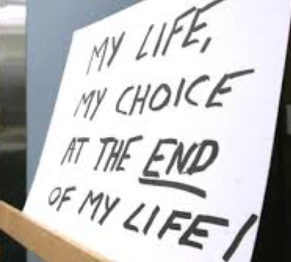Euthanasia is a topic I have struggled with since I was a teenager. It’s not a topic I like to talk about as a woman in a wheelchair.
It’s taken me a long time to feel comfortable talking about it openly, so here it is.
To put it bluntly, a person should be able to end their suffering if they wish to. I have listened to the arguments against it and I see no rationality to them.
Is it a decision I would make myself? No. That’s mainly because my condition isn’t life threatening, my life is pretty sweet and my medical situation is stable.
I do however have those days where I open my eyes and the first thing I think to myself is ‘I don’t think I can do this anymore’. But somehow I still force myself up and do what I have to do – basically ‘fake it till you make it’. It’s probably super unhealthy psychologically, but it’s where my life is at right now.
Every time someone tells me to ‘keep being brave’, or to ‘soldier on’, I want to slap them. You can’t tell me how to react to my situation from your position of privilege.
I cannot imagine feeling that every single day, knowing your body will slowly shut down before switching off completely, all while being completely mentally aware, all while doctors tell you there’s nothing they can do.
It is not fair to expect someone to endure that pain. It is especially unfair to make that decision without at least empathising with the feeling I described above.
If you don’t know what it’s like to feel that pain, its not right to judge someone who wants to make that decision for themselves, nor can you punish doctors for listening to their patients.






Well put, Latifa.
I’d say there’s also an elemement of double standards/discrimination involved here. An able bodied person can exercise a choise to end his/her life, regardless of their situation.
A person who is severly disabled, with limited mobility, has had that choice denied to them through circumstances.
It’s supremely ironic that those able bodied, reasonably healthy people who have no need of medically assisted euthenasia – can terminate their own life regardless.
Meanwhile, those who need medically assisted euthenasia the most, and who are immobile, suffering, and close to death anyway, are denied that choice.
This is the final debate in the My Body My Right to Choose debate – a debate started by women in the 1960s, over abortion. Now that debate extends to each and all of us, regardless of gender.
Lativa, I agree with our choice to die should prevail.
How come this Government says Less Government ” and then orders us to heel to their dictates?
Big Government is what we really have here, not less Government unless you are looking at the business sector where the government has hands off approach.
Like letting companies put chemicals in our food, our environment and our homes that will eventually kill us all & which be cynically causing suffering and death to many like the lady in the wheelchair.
http://www.ciin.org/mcs.html
http://www.epa.gov/heasd/chemicalsafety.html
Sorry the sick and dying are stung out like some trophy by this sick Government.
GRRRRRRRRRRRRRRRR.
While I understand the authors view the risk is that “well intentioned”(?) people decide or encourage others that euthanasia would be a choice they should make. I also question putting doctors in the position of having to end life when their main aim is to save lives. The reality is that in end of life situations painkillers or whatever are given so that life ends quickly. As always the devil will be in the detail & we need to see a proposed law before making a final decision.
A vet’s job is to save lives too… yet they have the boundaries & empathy to end suffering appropriately.
With the needed, sufficient safeguards, and after offered counselling and the likes, I think I can agree with you, Latifa. This is not something any person should decide upon lightly, but they have brought in law changes in a number of countries, and we need to look at their laws, to perhaps learn from how to change our law.
Andrew and Ben occupy adjacent beds in a hospice, they are terminal with similar conditions. The hospice beds are in high demand and not government funded.
Andrew has decided that he has lived all he wants and requests his life to be terminated, which duly happens under the new law.
Ben, despite the discomfort and inevitability, isn’t yet ready to die. What pressures overt and/or covert would Ben be under to make a similar decision?
Comments are closed.